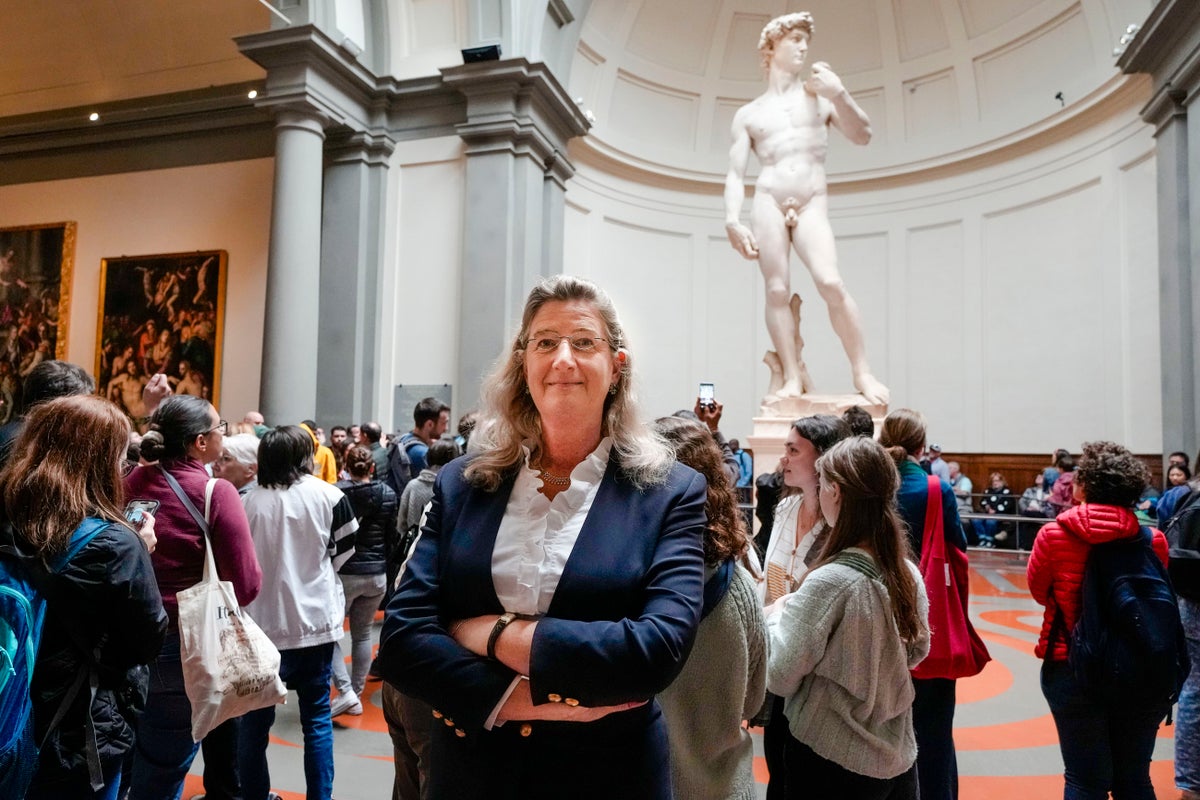
The German director of Florence’s Galleria dell'Accademia has succeeded in drawing visitors’ attention to masterpieces beyond Michelangelo’s towering David, while winning landmark court cases to protect the marble masterpiece's familiar image against misuse.
But even as Cecilie Hollberg highlights her achievements at Italy’s second-most-visited museum since arriving in 2015, rumors circulate that Italy’s far-right-led government intends to send her packing before her contract expires next year as it seeks to put more Italians in top cultural jobs.
It would be deja vu all over again. In 2019, another right-wing government fired Hollberg on short notice, and put the Accademia under the control of another Florence landmark, the Uffizi museum. She was reinstated the following year and the Accademia’s autonomy restored after that government fell.
Hollberg said she can't explain why the Accademia’s role as an independent museum is again under siege. She said she has never had a conversation with the culture minister or anyone else in the ministry to make her case about why the 239-year-old museum founded as a teaching facility should remain independent.
“That’s a very good question to ask: Why is the Accademia being targeted?’’ Hollberg said in telephone interview Monday with The Associated Press after leading foreign journalists on a tour of the museum.
Italy’s culture minister, Gennaro Sangiuliano, has made clear he feels too many foreigners are running top Italian cultural institutions, not just museums but also its opera houses. In a state TV interview this spring, he denied the government is prejudiced against the foreign managers, but said their prevalence demonstrated “a certain xenophile provincialism that we must by every account appoint a foreigner.”
Ten museum director positions are in the process of being filled, including at the Uffizi and Milan’s Brera, both now held by foreigners. Unlike a much-ballyhooed 2014 open call for museum directors, when a left-wing government actively sought to bring in foreigners, the new bid now requires fluency in Italian.
Despite having a contract that runs until June 2024, Hollberg is nervously awaiting an expected government decree on culture to see if the museum again loses its independence, which would cost her the job. This time, the Accademia would not be put under the Uffizi but under the Bargello National Museum, another Florence institution that is home to Donatello’s more diminutive David.
One of Hollberg's top achievements as Accademia's director has been to draw more attention to other masterpieces in the museum, including Giambologna’s marble sculpture “Rape of the Sabines” as well as paintings by Botticelli and Perugino.
Renovating the halls and improving the lighting has produced a new presentation to the artworks, giving “the sensation that they just came out of the workshop yesterday, or the day before,’’ she said. Hollberg said visitors now slow down guides so they can take in the other artworks, and people are spread throughout the gallery and not just congregated at David’s feet.
She also won landmark court cases protecting rights to the use of the David’s image, recovering some 300,000 euros ($337,000) this year and she expects that to double next year.
“This is a very important precedent for all cultural heritage. It says that whoever uses the image of David without authorization not only must pay for offending the work,’’ she said. “I did this battle for the dignity of the work, and we won. It is an epochal victory.”
Along the way, she has also increased the number of visitors, in part by extending museum hours two nights a week to allow people to visit when there are fewer crowds. The museum has had over a million visitors so far this year, and is well on its way to exceeding its 2019 record of 1.7 million visitors.
“This museum has been reborn, it has retaken its place in the hearts of Florentines. It has been renovated without changing its essence. There are a series of positive changes, which is what counts, the results that have been brought home,’’ Hollberg said. “The nationality is not important.”







